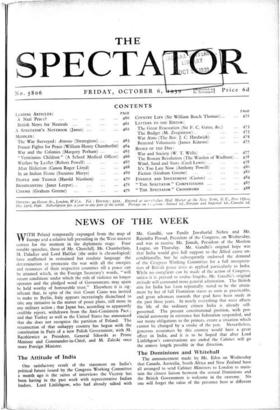The Attitude of India
One satisfactory result of the statement on India's political future issued by the Congress Working Committee a month ago is the series of interviews the Viceroy has been having in the past week with representative Indian leaders. Lord Linlithgow, who had already talked with Mr. Gandhi, saw Pandit Jawaharlal Nehru and Mr. Rajendra Prasad, President of the Congress, on Wednesday, and was to receive Mr. Jinnah, President of the Moslem League, on Thursday. Mr. Gandhi's original hope was that India would give full support to the Allied cause un- conditionally, but he subsequently endorsed the demand of the Congress Working Committee for a full interpreta- tion of British peace aims as applied particularly to India. While no complaint can be made of the action of Congress, unless it is pressed to undue lengths, Mr. Gandhi's original attitude will command more general admiration. The British aim for India has been repeatedly stated to be the attain- ment by her of full Dominion status as soon as practicable, and great advances towards that goal have been made in the past three years. In nearly everything that most affects the life of the ordinary citizen India is already self- governed. The present constitutional position, with pro- vincial autonomy in existence but federation suspended, and our treaty obligations to the princes, create a situation which cannot be changed by a stroke of the pen. Nevertheless, generous assurances by this country would have a great effect in India, and it is to be hoped that after Lord Linlithgow's conversations are ended the Cabinet will go the utmost length possible in that direction.


































